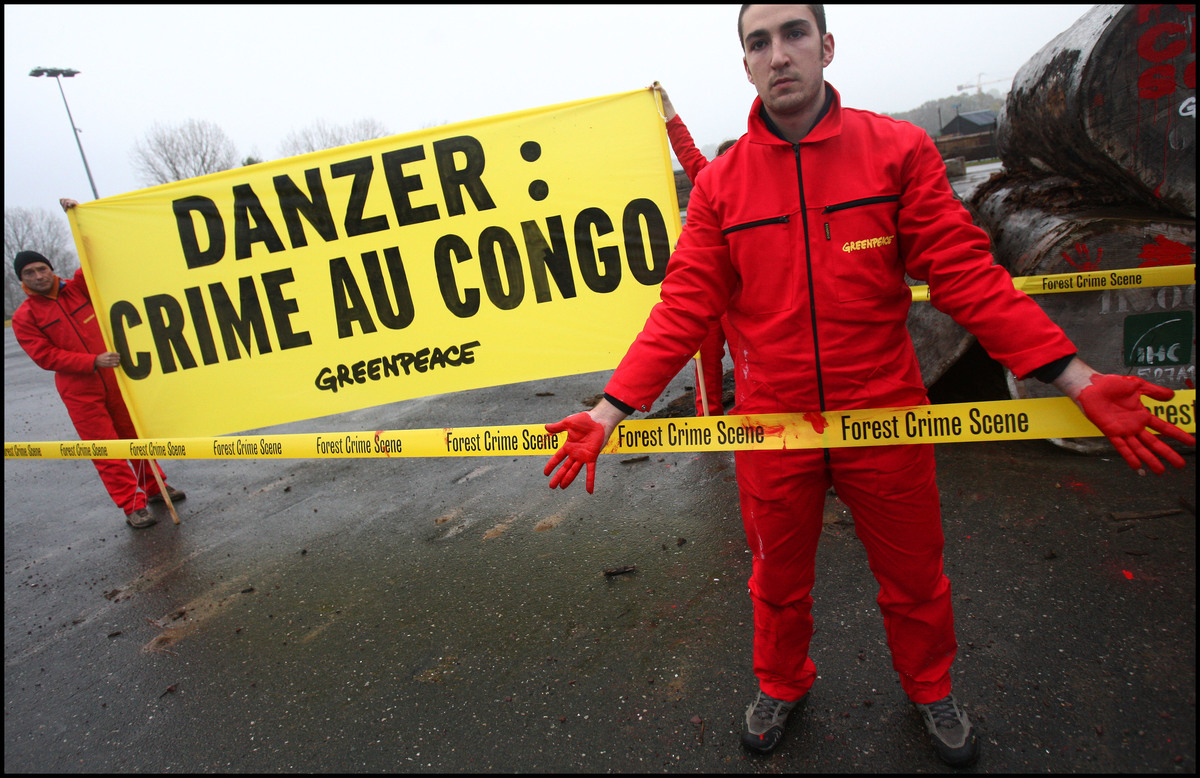
Greenpeace uncovers a shipment of tropical timber from the Democratic Republic of Congo in the French port of Caen and marked the area as a “Forest Crime Scene” with messages painted in red.
To the layperson the world of forest certification is often a technical one that does not seem to operate at what could be called a breakneck pace. However, the Forest Stewardship Council (FSC) has this week reached a landmark decision that fits the old adage that ‘good things come to those who wait’.
The Swiss-German timber group Danzer will be ‘disassociated’ from the FSC, the global certification system for responsible for forest management. This means the company loses all its FSC certificates worldwide.
The decision is the culmination of an 18-month effort by Greenpeace following a complaint made in 2011. That complaint stated that while Danzer bore the FSC stamp and projected a ‘green’ image to the world, its own operations were involved in human rights violations in the Democratic Republic of Congo (DRC). According to the independent forest monitor in DRC, the company was logging illegally on a systematic scale in 2011 when it received an FSC certificate for controlled wood.
The FSC has a set of minimum criteria for companies it will associate with – the Policy for Association. This is done to prevent the bad and the ugly from joining the scheme and helping to maintain FSC credibility in the marketplace.
The Policy for Association should exclude companies from the FSC that are active in deforestation, illegal logging, human rights abuses, destroying high conservation value forests and using GMOs. The FSC has now done the right thing to protect its reputation and brand by breaking ties with the Danzer group.
To exemplify why all of this is so crucial it is worth travelling back and looking at why Greenpeace International filed the complaint against Danzer.
Many of the local community were subsequently injured and had the their properties destroyed. There were also allegations of rape. One person later reportedly died of their injuries.
For Greenpeace, the case was clear-cut: Danzer needed to bear some responsibility for the company’s involvement in these violations. We had been documenting conflicts in the company’s logging areas in the DRC since 2005 and this was not an isolated incident.
We welcome FSC’s show of teeth, although it is still unclear if this will help the people of the DRC and other countries or if it will rectify past transgressions by Danzer. But, it does send the right message. It is an important signal for forest managers that these practices are totally unacceptable and that they can be held responsible for their actions.
Greenpeace does not expect any FSC certificates to be handed out in the DRC in the near future as companies are not ready for them and neither is the FSC. This decision underlines that.
Unfortunately, the Yalisika case is not an isolated event. Violent conflicts occur frequently in the DRC where the logging sector is in a state of organised chaos.
The FSC’s decision will hopefully spark a long awaited process to strengthen its system and make it credible in high risk areas where good governance, the rule of law, civil society are lacking and corruption is common practice.
Since the complaint was made Danzer has divested Siforco and sold its concession to Groupe Blattner Elwyn.
But what became clear today is that it cannot just sell up and walk away from the problems it has caused in the past. It will now have to pay for it by losing its certificates and do what it should have done years ago – respect the rights of local people and provide them with benefits.
